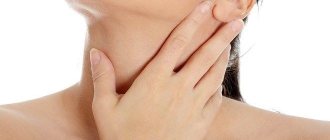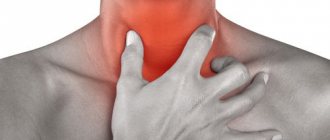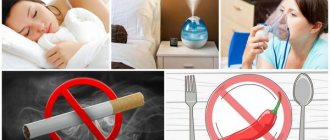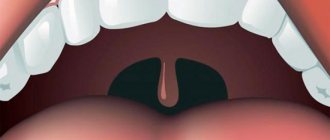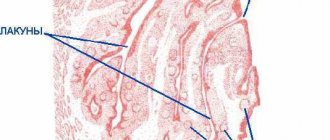Other pathological processes
Multiple in nature. We are talking about the following conditions:
- Poor circulation in the area of the esophagus and the initial parts of the lower respiratory tract.
- Tumors of the upper respiratory tract. Both malignant and benign.
- Disorders of the innervation of the upper respiratory tract.
- Also pathological phenomena in the brain. Generalized innervation disorders are possible.
- Chemical, thermal and other types of damage to the respiratory system.
- Finally, banal “overdrying” of tissues is possible as a result of insufficient humidification of the surrounding atmospheric air.
All these are the reasons for a sore throat for a long time.
Causes of sore throat
The occurrence of the symptom is usually associated with various inflammatory and non-inflammatory processes both in the respiratory tract and in the organs that are located next to the pharynx and larynx. Less commonly, irritation of the pharyngeal mucosa is of physiological origin and is caused by eating spicy or too hot food, inhaling frosty air while walking or running quickly. Itching, caused by dry mucous membranes, is observed when the overall humidity in the room decreases.
Inflammation of the oropharynx
Pathological processes involving the mucous membrane of the oropharynx are the most common cause of soreness. The development of the symptom is due to irritation of nerve endings due to swelling and infiltration of the mucous membrane, release of inflammatory mediators, vasodilation and desquamation of the affected epithelium. Perspiration occurs against the background of diseases such as:
- Respiratory viral infections
. Most ARVI pathogens have a high affinity for epithelial cells of the oropharynx and larynx. After the introduction of influenza viruses, parainfluenza, rhinoviruses, and other viral particles, a local inflammatory reaction is formed, accompanied by soreness and then pain in the throat. In some diseases, discomfort in the throat precedes damage to other systems: the digestive tract (rotavirus infection), lungs (coronaviruses), lymphatic tissue (infectious mononucleosis), parenchymal organs and skin (rubella). - Bacterial inflammation
. A sore throat caused by persistent bacteria is often observed with streptococcal infections. Significant discomfort is observed with sore throat, acute pharyngitis and chronic tonsillitis. Severe itching caused by mucus draining from the nose and spasmodic coughing is characteristic of whooping cough. Severe nasopharyngitis with severe intoxication is observed with meningococcal infection. Moderate tickling in combination with other catarrhal symptoms manifests itself as a flu-like form of psittacosis. - Catarrhal reaction in other infections
. Discomfortable tickling sensations occur at the initial stage of some acute and chronic infectious diseases that cause systemic damage to the body. Flu-like sore throat is possible in patients with developing viral hepatitis A, pseudotuberculosis and secondary syphilis. A feature of the symptom in such pathological conditions is its frequent combination with general intoxication, arthralgia, myalgia, skin rashes and other signs of multiple organ disorders.
Severe erosive and ulcerative destruction of the epithelium with intense soreness and soreness in the throat is observed in infectious diseases of the oropharynx and nasopharynx against the background of decreased immunity (pharyngomycosis, lesions of the ENT organs in HIV-infected people). The symptom is felt more pronounced against the background of ARVI during pregnancy, which is associated with physiological suppression of the body’s defenses and increased emotionality of pregnant women.
Non-inflammatory pathology of the oropharynx
Irritation with the appearance of characteristic scratchy sensations is observed when the mucous membrane is exposed to non-infectious factors - mechanical trauma, pressure from space-occupying formations. Sometimes the symptom is provoked by food intake (damage from solid foods, fish bones), stress, conflict, or anxiety. In non-inflammatory diseases, hyperthermia and other signs of general intoxication are often absent, but copious pathological discharge (mucous, bloody discharge) is possible.
Perspiration is observed when tissue is damaged by foreign bodies, the presence of a tonsil cyst, or benign tumors of the pharynx. In a Le Fort 1 fracture of the upper jaw, a tickling sensation is associated with a downward displacement of the uvula of the soft palate and, as a rule, is combined with nausea and obstruction of the upper respiratory tract. In rare cases, the symptom has a functional origin and develops against the background of a hyperesthetic variant of pharyngeal neurosis, accompanied by a feeling of dry mucous membranes and a lump in the throat.
Diseases of the larynx
The occurrence of uncomfortable tickling sensations is associated with the anatomical proximity of the pharynx and the upper respiratory tract, the possibility of ascending or descending spread of inflammatory and destructive processes, and vascular reactions. In this case, the tickling is combined with characteristic voice disorders - dysphonia or aphonia. The causes of the symptom are usually:
- Inflammatory diseases
. Specific manifestations of soreness for acute or chronic laryngitis include a feeling of dry mucous membranes, burning, tickling, and scratching. Discomfort is first localized in the upper part of the neck, then it can spread to the back wall of the pharynx. In chronic hyperplastic laryngitis, in addition to soreness and hoarseness, a foreign body sensation is often noted. For laryngotracheitis, a combination of a tickling sensation and a cough is typical. General intoxication is often mild or moderate. - Neurotic disorders
. A persistent subjective sensation of tickling sensation in the laryngopharyngeal region is a characteristic sign of voice formation disorders with functional paresis of the larynx. The feeling of discomfort is aggravated by pain and a transient change in phonation. There are no visible signs of inflammatory or other pathological processes, the voice remains quite sonorous during laughter, coughing and crying, other neurotic stigmas are detected: complaints of headache, emotional lability, fatigue, insomnia.
The occurrence of soreness at the level of the larynx is also possible with the development of benign tumors, cancer of the hypopharynx and larynx. Such uncomfortable sensations are particularly persistent and are combined with progressive voice impairment and breathing difficulties. When the tumor is localized in the lower part of the pharynx, abundant salivation is observed.
Thyroid diseases
The development of tickling sensations when thyroid tissue is damaged is facilitated by the anatomical location of the organ in the upper part of the trachea, its innervation by the recurrent laryngeal nerve, the fibers of which provide sensitivity and motility of the larynx. A sore throat in the middle and lower part of the throat is accompanied by thyroid nodules and cysts, papillary cancer, and other neoplasms growing in the direction of the respiratory tract. In the later stages of the volumetric process, breathing difficulties and visible deformation of the neck are also detected. Possible signs of hyperthyroidism: emotional lability, irritability, exophthalmos, tachycardia.
Allergy
Various types of discomfort in the nasopharynx and oropharynx are typical for acute atopic reactions and chronic allergic diseases. In the first case, tickling occurs suddenly, is combined with nasal congestion, lacrimation, sneezing and skin itching, most often manifested by allergies to dust, pets, or pollen. As a concomitant symptom, tickling sensations in the larynx and pharynx are noted during paroxysmal cough with difficulty breathing and expiratory shortness of breath in allergic bronchitis. The cause of the development of soreness in allergies is usually irritation of the mucous membrane due to the release of histamine and other inflammatory mediators by mast cells under conditions of sensitization to a particular allergen.
Bronchopulmonary pathology
The causes of discomfort in the pharynx and larynx during diseases of the bronchi and lungs are usually irritation of the mucous membrane when it comes into contact with expectorated sputum, other pathological discharge and a reaction to a strong cough. With tracheobronchitis and acute bronchitis, tickling is often combined with rhinorrhea or dry nasopharynx, hoarseness, and pain when swallowing. Symptoms of acute respiratory infections with a tickling sensation sometimes appear in the initial stages of certain types of pneumonia - atypical mycoplasma and caseous pneumonia.
With aspergillus tracheobronchitis and interstitial pneumonia, the main clinical symptoms are preceded by persistent discomfort in the pharynx, larynx with hyperthermia and a persistent feeling of bitterness in the mouth. Soreness and changes in voice accompanied by a persistent cough, pain when inhaling, and expiratory shortness of breath are observed during secondary infection in patients with osteochondroplastic tracheobronchopathy. Most pathological processes accompanied by hemoptysis also occur with a tickling sensation.
Esophageal damage
The development of symptoms in patients suffering from esophageal pathology is often caused by the reflux of gastric contents due to violations of the closure function of the cardia. When aggressive secretions and digested food enter the esophageal mucosa, irritation spreads to the upper sections. In addition, when belching occurs, the acidic contents of the stomach directly affect the epithelium of the pharynx, causing a local response.
Perspiration is observed with gastroesophageal reflux disease, especially against the background of GERD during pregnancy, when there is a higher reflux of liquid gastric chyme. Such tickling sensations with a burning sensation in the hypopharynx, dysphagia, coughing up large amounts of mucus and dysphonia are caused by laryngopharyngeal reflux. Scratching of the throat, dry cough, excessive salivation, and a “lump in the throat” are characteristic of diverticulosis of the esophagus with the formation of pharyngoesophageal pouch-like protrusions (Zenker’s diverticulum).
Occupational pathology
Irritation of the laryngopharyngeal mucosa associated with the performance of work duties is observed with inhalation of toxic substances and high vocal load. Occupational diseases, the clinical picture of which may include a sore throat symptom, can occur both acutely and chronically. Patients often experience voice changes and signs of damage to the bronchi and lungs. The causes of tickling sensations in the larynx and oropharynx can be:
- Acute poisoning
. Acute berylliosis, foundry fever and toxic pulmonary edema begin with a feeling of dry mucous membranes, soreness in the larynx and pharynx, an unusual taste in the mouth, and sometimes watery eyes. Subsequently, the clinical picture quickly worsens with hyperthermia, myalgia, paroxysmal cough, chest pain, and worsening general condition. - Chronic intoxication
. Changes in the mucous membrane of the laryngopharynx, manifested by soreness, are possible with pneumoconiosis and respiratory allergies. In patients suffering from occupational bronchial asthma and byssinosis, the symptom is often combined with difficulty inhaling and exhaling, coughing, shortness of breath, and then respiratory failure. - Damage to the vocal folds
. In specialists whose activities involve overload of the vocal apparatus, soreness is caused by local hyperplasia of the connective tissue. When nodules of the vocal cords appear, in addition to laryngopharyngeal discomfort and burning, the voice becomes hoarse, fatigue is noted, and an unproductive cough occurs.
Why does my throat feel sore but not sore?
Soreness can appear for various reasons . In some cases, this is temporary and goes away over time after coughing.
And in other cases, soreness can turn into pathology , where only a specialist can name the exact cause.
But your throat may not hurt.
If a person develops this disease, the following factors could provoke it.
Infectious diseases
Tissues are affected by viruses and bacteria. Their spread always occurs without pain.
Note! Perspiration appears gradually due to the penetration of viruses into the bronchi and larynx.
Parasites that live in tissues and the stomach can also infect other human tissues. They also bring discomfort to a person in the form of a sore throat.
Metabolic products cause infection. It begins to affect the throat and cause a tingling sensation in the throat.
- Sore throat during pregnancy: how to treat it
The most common infectious diseases include:
- Tonsillitis. In 70% of people, the disease occurs with pain. This occurs due to inflammation of the tonsils. But in the remaining 30%, the pathology manifests itself painlessly with tickling and severe coughing.
- Pharyngitis. The disease can be recognized by increased dryness and a large amount of mucus. It is she who gradually clogs the throat and causes irritation. The disease can be cured with medicines and folk remedies.
Bad habits
Alcohol. Alcoholic drinks are harmful to the body. Ethyl alcohol damages the mucous membrane and corrodes it.
Keep in mind! The stomach also suffers. The soreness appears due to the release of contents into the larynx.
Cigarettes. When smoking smoke, soot and various toxins settle on the throat. They penetrate the tissue and cause an inflammatory process.
This is an ideal environment for bacteria to multiply. In addition, mucus begins to secrete, which must be constantly spat out.
Spicy food. Any hot seasonings, pepper, etc. eat away the mucous membrane. Everything leads to unpleasant sensations in the throat.
If the soreness is temporary, then you just need to swallow saliva to moisten your throat. The irritation will disappear.
Allergic reactions
Appear due to a large number of allergens . They provoke an inflammatory process in the throat, which causes soreness and cough .
You should know! Irritation can be prevented if the patient detects and eliminates contact with the allergen.
- Getting rid of a sore throat using traditional methods
Environment
Itching appears due to dry air . A person does not have enough saliva to moisten his throat.
The illness may be temporary and will pass as soon as comfortable conditions are created.
You just need to drink water to restore the natural mucous membrane.
Problems with the gastrointestinal tract
It may irritate due to problems with the stomach, reproductive system and thyroid gland.
Local treatment here will not bring maximum effect, since the underlying cause will not be eliminated.
Know! With a bacterial infection, the patient will not have pain, but the soreness is accompanied by fever. Hearing problems may also occur.
Burning in the mouth and throat
NATALIA, Yartsevo
January 4, 2020
Hello, dear doctors. I really need your help and advice. This is not the first time I’ve asked a question and I haven’t received an answer. We turn to the site when we can’t find help or an answer locally. Are there really no competent doctors on the site who could get to the bottom of the issue? and helped in solving this problem. Since the end of August, desquamative glossitis of the tongue appeared. Since mid-October, I began to feel discomfort in the throat, namely a burning sensation, rawness, sometimes a feeling as if there was a tear in the throat, as if it were burned, and there is also a burning sensation in the mouth, especially after eating. I visited ENT doctors (four ENT doctors) and were treated for pharyngitis. I took everything that the ENT specialist prescribed, washed the lacunae three times, although there were no plugs. I took a swab from the throat - nothing was revealed. The burning in my throat continues. FGDS passed, there is no acid reflux, the cardia is completely closed. Ultrasound of the thyroid gland, ultrasound of the thyroid gland in October - the volume of the thyroid gland is normal. I tested TSH -2.58, free T4 -13.9, ATPO negative. MRI of the brain, Ultrasound of the salivary glands, ENMG. I took a general and biochemical blood test in September, and in December I took a full blood test. All studies and tests were normal. I took the PPI-nolpaza, did not notice any improvement, took omeprazole, almagel, but nothing helped. These symptoms have been bothering me for three months now. At the last appointment, the ENT specialist noticed asymmetry of the left palatal arch, a cut in the soft palate on the left is in question? I referred her to a neurologist and a dentist. I asked for a referral to an ENT doctor at a regional hospital. The ENT doctor-phoniologist did not reveal anything on her side. She ruled out paresis of the soft palate and diagnosed glossalgia. The dentist palpated the salivary gland, but did not reveal anything. I also did an ultrasound salivary glands, everything is also normal. A neurologist made a diagnosis of neuropathy of the glossopular nerve. She sent me for an MRI of the brain. I had an MRI and no pathology was detected. I had an ENMG. At night I don’t feel a burning sensation, in the morning it feels like a soreness, and then the whole day there is a rawness, a burning sensation in the throat, in the mouth it also burns, but in the throat almost constantly. I did an MRI of the spine. Here is the conclusion: signs of degerative changes in the spine. With a violation of the statics. Extrusion of the intervertebral disc C5-C6. Diffuse disc-osteophytic complexes of the intervertebral discs C3-C4, C4-C5, C6-C7. Secondary stenosis of the spinal canal at the level of C3-C7 1st degree .Posterior diffuse bulging of the C2-C3 intervertebral disc. Osteochondrosis, Spondylosis. Spondyloarthrosis. Schmorl's nodes in the C4-C7 segments. Structural changes in the C5 vertebral body probably correspond to hemangioma. At the moment, 10 ampoules of milgam, 10 amps. Neuromedin, I’ve been taking Teraligen for a month, 1/2 tablet three times a day, but I don’t feel any improvement. Please help me find the problem of my discomfort in the throat and mouth. In what direction should I move next to find the cause and methods of treatment. I really hope for yours answers and help.
The question is closed
Once
ENT doctor
competent doctor
Which specialist should I contact?
Diagnosis of pathological processes is carried out by specialists of various profiles.
- If there is a problem with the gastrointestinal tract, you will need to consult a gastroenterologist.
- If you have allergic pathologies, you cannot do without consulting an allergist-immunologist.
- Innervation disorders are treated by neurologists.
- Tumors are the field of activity of oncology specialists.
- Finally, infectious diseases are treated by general practitioners.
First of all, it is recommended to see a doctor of the widest possible profile. That is, the therapist. He is a kind of beacon. A general practitioner carries out initial routine measures, determines the nature of the pathological process and refers the patient to specialists.
- Severe sore throat, sore throat and dry cough - possible causes and treatment at home
At the initial appointment, any doctor asks questions about the state of health, complaints, their duration and nature.
An anamnesis is collected (the doctor finds out what the person was or is sick with). It is mandatory to establish the presence of allergies and previous infectious diseases.
Treatment with medications
Before you begin to carry out therapeutic actions, you need to understand the cause of the disease . Treatment can be divided into several methods :
- Lozenges for sore throat;
- various syrups;
- gargling.
The effect will appear almost immediately . Why is this happening? If you reduce the activity of pathogens, the body itself will begin to fight bacteria and foci of disease.
It is important to remember that you need to take medications half an hour before and after meals.
Tablets and lozenges
When the mucous membrane becomes inflamed and soreness appears, you should immediately take a lozenge.
Stay up to date! Such drugs have an expectorant, antiseptic and mucolytic effect.
The pharmacy sells a huge number of similar products , some are even similar in composition. So, what can be found on sale:
- Strepsils is an antiseptic. Its main advantage is that there are several types of this drug. Lozenges are popular among adults and children. If taken correctly, the effect will come instantly.
- Septolete . It is popular due to its component – benzalkonium chloride. Because of this ingredient, bacteria lose activity and die. Essential oils work on the nasal passages and make breathing easier. The infection stops spreading.
- Inhalipt. The product comes in the form of a spray and contains many different components. One of these components is spreptocide. It effectively fights germs and clears the throat of bacteria. Essential oils accelerate its absorption. Thanks to this spray, the mucous membrane returns to its normal state, and the soreness disappears.
- Faringosept. It is considered the most effective drug, as it is time-tested. Helps in the fight against complicated tonsillitis. Has a chocolate taste. Children will especially like it.
- Hexoral. The most active substance is hexitidine. It has not only an analgesic effect, but also a hemostatic and analgesic effect.
If you have a sore throat, it means that the body is getting rid of phlegm in the lungs and bronchi. Mucolytics improve sputum discharge.
But after a few days, a productive cough replaces the dry one . When exhaling, mucus and sputum appear.
For your information! In this case, the following drugs are recommended:
- Doctor Mom . The medicine gained its fame thanks to advertising activities. The manufacturer claims that the drug contains only natural products and is considered harmless. But you need to be careful here, since the multicomponent composition can cause an allergic reaction.
- Neo-bronchol . The drug is made in Germany. Available in the form of lollipops. Acts on the respiratory tract, clearing them of mucus. In addition, it softens the mucous membrane of the throat.
- Tussin plus. It is the most powerful and effective drug. It contains dextromethorphan hydrobromide and guaifenesin. They actively affect cough and reduce it. There may be side effects, so it is best to consult your doctor.
Syrups
Reference! In modern medicine you can find not only tablets and sprays, but also syrups. The advantage is that they taste good.
Children really like these medications. What remedies will help get rid of a sore throat:
- Codelac Broncho . It contains ambroxol, which is a mucolytic component. Sodium glycyrrhizinate has an anti-inflammatory effect. Thyme essential oils fight viruses and spasms.
- Herbion with plantain. This is a phytotherapeutic syrup that consists of only herbs. It combines mallow flowers with plantain. Ascorbic acid affects oxidative processes and restores the immune system.
- Ascoril. Contains salbutamol and bromhexine hydrochloride. The syrup is very quickly absorbed into the tissue and relieves the inflammatory process. Copes with spasms that cause coughing. Thanks to this drug, bronchial conductivity improves.
Important! In addition to various tablets, syrups and sprays, the pharmacy sells special gargles. This:
- Streptocide. Available in powder and tablet form;
- Furacilin. Dissolve two tablets in water and gargle fifteen minutes before meals;
- Bicarmint. Contains mint and menthol oil, borax, as well as table salt and soda. Helps get rid of not only sore throat, but also fungal infections.
